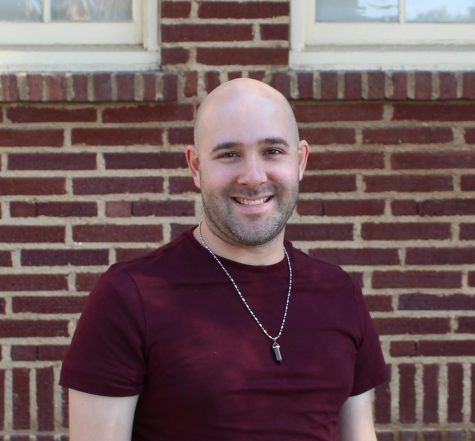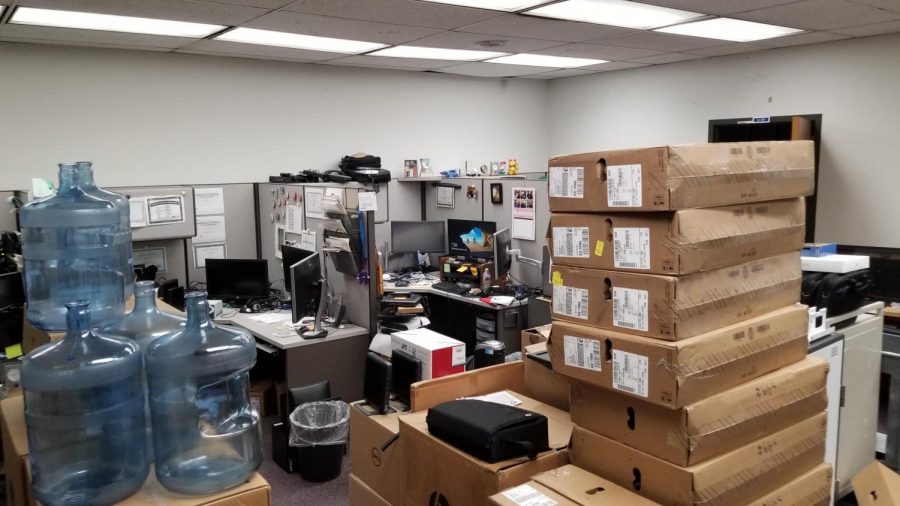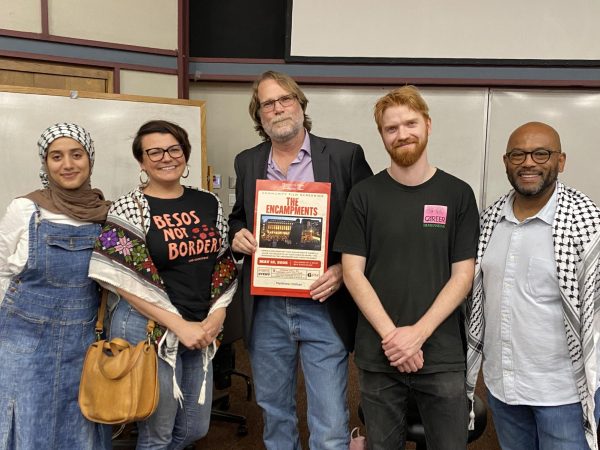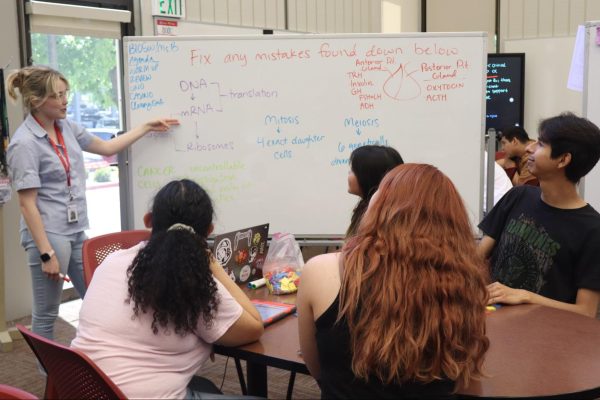Technology Support Services Department Seeks New Direction Following Departure of Director
“The high turnover of directors of technology over the past few years has placed the division in disarray. TSS staff are constantly in a reactionary mode, doing the best they can to maintain a semblance of prioritized service to FCC students, faculty and staff,” said a technology support staff in the office, who wished to remain anonymous.
Brand new as well as used, non-working computer towers and screens stack high in the already cramped cubicles in the Technology Support Services office in the LI building. Extension cords and mice and their cables hang out from boxes which, both empty and full, reach from the floor nearly to the ceiling.
Empty water jugs add to chaotic workspace that accommodate 15 technicians who call the building their office.
Clutter is just one of the numerous challenges plaguing TSS, the department which is responsible for everything from faculty computers and workstations to students’ access, plus Wi-Fi connectivity and Canvas accessibility — services which are pivotal to the operations of Fresno City College.
At the moment, the office is without a director, and seemingly without a clear direction, according to claims by several employees of TSS.
Filling the Musical Chairs
What is known is that with the Feb. 28 departure of Nathan Zierfuss-Hubbard, most recent director of TSS, the department is once again led by an acting director. This is the sixth change in TSS leadership in the last three years.
“The high turnover of directors of technology over the past few years has placed the division in disarray,” said a technology support staff in the office. “TSS staff are constantly in a reactionary mode, doing the best they can to maintain a semblance of prioritized service to FCC students, faculty and staff.”
Numerous TSS staff said they were voicing their frustration about the high turnover rate of the director position anonymously because of fear of reprisal.
The departure of Zierfuss-Hubbard after less than two months as director leaves the direction of the department uncertain for the time being. Zierfuss-Hubbard, whose last day was Feb. 28, said he resigned to take a position with a university within the CSU system; however, TSS has its most important role unfilled.
The high turnover in the TSS director position leaves the department without an acting director for the sixth time in three years.
Don Lopez, vice president of instruction has now added the interim director of technology to his responsibilities until another interim is found. Lopez held the position from 2005 to 2015 when the revolving door of TSS directors started. Harry Zahlis succeeded Lopez but left in 2019, giving way to Dante Alvarado.
FCC President Carole Goldsmith said that the administration intends to conduct a national search for Zierfuss-Hubbard’s replacement in order to stop the high turnover rate in the position.
Lopez added that the administration is searching for a replacement, but acknowledges that it will take the rest of the semester to find a full-time replacement for the TSS Director position
because the vacancy is about a month away from being officially announced, and the hiring process itself typically takes about 60 days to select the right candidates.
“We are looking at candidates,” Lopez said, regarding the search. “Our classification study with the district has just finished up so they’re in the middle of looking for about 90 positions for the entire district that are unfilled currently or that we’re working on.”
Lopez gave a positive outlook on the situation. “I would think that they would be ready to start announcing for that position in the next 30 days or so,” Lopez said about the search for Zierfuss-Hubbard’s replacement.
In the meantime, administration is searching for a part-time replacement to fill the space left following Zierfuss-Hubbard’s resignation earlier this year in February.
The Space Issue
The constant turnovers in the director position is not the only problem handcuffing the TSS department’s ability to work efficiently. The clutter in the state of the TSS office clearly demonstrates the situation.
“We’re just not good at the processing side of it,” Lopez said of the complicated process of storing outdated equipment. “We should be better at receiving and distributing those materials.”
Regarding the old equipment in the TSS office, Lopez explained that ordering new equipment and processing old equipment it is a balancing act. He added that the State Center Community College District’s lack of storage creates an ongoing problem for the department.
“We have to store them [computers and other hardware] somewhere,” Lopez said about the clutter. “So we run into issues of storage because turning physical space into storage for computers means that we can’t use them for classrooms.”
Lopez said the TSS department is looking to potentially rent space from the Fresno Unified School District to help alleviate some of the storage burden on the FCC campus.
Lopez also said that storage could be improved from within the department and the college administration.
Lopez says when old resources must first be shipped off to the “boneyard” – an off campus site designated for equipment that is no longer being used — before they can be discarded.
Unfortunately this process takes time because old equipment cannot be tagged for disposal until new equipment has been purchased to replace the old ones.
“This fall, we deployed 800 [new] student computers,” Goldsmith said of new orders that the TSS department is responsible for. They are also in the midst of deploying 100 new faculty computers.
Goldsmith also said that the cause of the problem extends beyond the college.
“The district technology plan recognizes that we probably need to restructure and work better as a district,” Goldsmith said about the space issues plaguing TSS.
How does this affect students?
Many of the issues do not impact FCC students in a directly visible way, except for the perpetual connectivity problems with the Wi-Fi on campus.
Connectivity issues have plagued the campus at FCC for years now. Lopez says the college looks to alleviate the problem by starting an on-campus help desk as an offshoot of the primary help desk.
“We’ve been discussing following a model similar to what Fresno State does,” Lopez said. “We would have a centralized point help desk on campus that could assist students in connecting to the Wi-Fi or answering a Canvas question, or showing them how to load Office 365.”
Currently there are three different campus based help centers across the district, but none is resident on the FCC campus.
“The way I’ve looked at it is to have it manned by students who would then be trained in how to do all of these different kind of things,” Lopez said. “It would be very similar to standard corporate environment where level one kinds of things could be handled by the technician on site; level two could be handled by our TSS staff members, and level three potentially to the district for those that we can’t seem to get answered.”
Lopez said that in addition to an on-campus help desk, the administration has hired an outside contractor to evaluate the on-campus network.
“We’ve got to do a better job in designing a way that the network hands off students from one side or one AP (access point) to the next as you go around campus,” Lopez said.
Despite the growing list of technology problems faced on a daily basis by the TSS staff, Goldsmith has high hopes for the future of the TSS department. “I look forward to the district-wide technology plan that will probably shed some light on the fact that the colleges need more resources as it relates to technology.”

Ben Hensley is a fifth semester journalism student at Fresno City College. Having been with the Rampage for all five semesters, Hensley has progressed...






